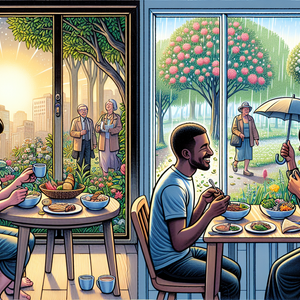The Cultural Impact of Train Companies in Chicago: A Moving Canvas

To understand the cultural significance of Chicago's train companies, we must first look at the historical context. Established in the late 19th century, the Chicago Transit Authority (CTA) and other rail companies, such as the Chicago and North Western Railway and the Illinois Central Railroad, transformed the city, facilitating movement and commerce. As immigrants flocked to the city—especially during the Great Migration—the trains became the veins that connected diverse communities, giving rise to a melting pot of cultures. This intersection of peoples laid the groundwork for a vibrant cultural scene that would flourish alongside the railroads. The CTA, in particular, has been instrumental in shaping Chicago's urban experience. The 'L' trains, which began service in 1892, have become iconic to the city's skyline and daily routines. The historical significance of these railways is not only measured by their ability to transport people but also by their role in fostering a sense of belonging among residents from various backgrounds.
Art on the Tracks: Murals and Public Installations
As Chicago's train systems expanded, so did their influence on public art. Many train stations became canvases for local artists, reflecting the community's identity and stories. For instance, the Kedzie station features a stunning mural by artist Chris Silva, depicting the rich tapestry of Chicago's neighborhoods. This artistic expression not only beautifies the transit experience but also serves as a reminder of the diverse cultural heritage that characterizes the city. Moreover, the trains themselves have inspired various art forms. The "Chicago Transit Authority" album by the band Chicago, released in 1969, encapsulates the spirit of the city, with songs that resonate with the experiences of commuters and residents alike. The music and art inspired by the trains contribute to a shared cultural narrative, making the railways a symbol of connectivity and community. Public installations have also been a vital part of the artistic dialogue fostered by the train systems. Projects like "Poetry in Transit," which displays poems by local writers in train cars and stations, invite passengers to engage with literature while commuting. These creative interventions help to transform everyday experiences into opportunities for cultural enrichment.
Community Identity and Storytelling
The trains in Chicago are not just vehicles for passengers; they are also vessels of stories and experiences. Commuters often engage in conversations that reveal the city’s character, sharing anecdotes that reflect both the struggles and triumphs of urban life. Train stations have become informal gathering places where friendships are forged, and local culture is exchanged. Organizations like the Chicago Transit Authority have recognized the importance of storytelling in fostering community connection. Initiatives such as "Your Story, Your Train" encourage riders to share their experiences and memories associated with commuting. These stories are then featured in various formats, including social media campaigns and public displays, amplifying the voices of everyday Chicagoans and celebrating the communal ties that the train systems help create. A poignant example of this storytelling culture is evidenced in the “My CTA Story” series, which highlights the personal narratives of riders, showcasing how the trains have played a role in their lives, from significant life events to daily rituals. This initiative not only enhances the sense of community but also connects individuals to the broader narrative of Chicago’s history.
Innovative Cultural Collaborations
In recent years, the relationship between Chicago's train companies and local artists has evolved into innovative collaborations. The CTA has partnered with organizations like the Chicago Cultural Alliance to promote cultural programming along train routes. This initiative includes art installations, performances, and community events that highlight the rich cultural diversity found throughout the city. One notable project is the "Art on Track" initiative, which features live performances and art displays in select train cars during special events. This unique approach not only entertains commuters but also fosters a sense of pride and belonging among residents, showcasing the city's artistic talents while enhancing the commuter experience. Additionally, the CTA has hosted exhibitions that feature visual art from local artists in stations, turning waiting areas into galleries that celebrate local talent. These collaborations not only revitalize the transit environment but also bridge the gap between the arts and everyday life, making culture accessible to all.
The cultural impact of train companies in Chicago transcends mere transportation. These systems have fostered artistic expression, community identity, and storytelling, creating a vibrant cultural tapestry that reflects the city's diversity. As Chicago continues to evolve, the railways will undoubtedly remain a vital part of its cultural landscape, serving as both a conduit for movement and a canvas for creativity. The trains and their stations are not just transit points; they are a living testament to the city's rich history, dynamic culture, and the enduring spirit of its people. In this moving canvas of steel and art, the essence of Chicago continues to thrive, connecting its past, present, and future.
Public Transit Marketing Specialist
Chicago Transit Authority, regional transit authorities across major cities, marketing agencies focused on public sector clients
Job Description
Develop and implement marketing campaigns to promote the use of public transportation, particularly the Chicago Transit Authority (CTA).
Analyze ridership data to identify target demographics and tailor communication strategies accordingly.
Collaborate with local artists and community organizations to create engaging promotional materials that reflect the cultural diversity of the city.
Skills
Strong background in marketing
Familiarity with data analytics tools
Excellent communication skills
Experience in public relations or community engagement is a plus.
Transit-Oriented Development Planner
City planning departments, urban development firms, nonprofit organizations focused on sustainable urban initiatives
Job Description
Plan and oversee development projects around transit hubs to enhance accessibility and promote sustainable urban growth.
Conduct community outreach to gather input on development proposals, ensuring they align with local cultural and social needs.
Collaborate with architects, city officials, and business owners to design spaces that integrate transit with community resources.
Skills
Proficiency in urban planning software
Strong project management abilities
Solid understanding of zoning regulations
Experience in community development is essential.
Transit System Art Curator
Chicago Transit Authority, local arts councils, cultural institutions
Job Description
Curate and manage art installations within transit stations and vehicles, collaborating with local artists to reflect the city’s cultural narratives.
Organize exhibitions and events that promote community engagement with the arts, enhancing the commuter experience.
Develop partnerships with cultural organizations to facilitate artist residencies and public art projects.
Skills
Strong background in visual arts
Knowledge of public art policies
Experience in event planning
Excellent networking skills
An eye for artistic detail are crucial.
Community Engagement Coordinator for Transit Systems
Chicago Transit Authority, community-based organizations, urban advocacy groups
Job Description
Facilitate communication between transit authorities and the community to gather feedback and improve services.
Organize community events and forums that foster dialogue about public transportation issues and initiatives, including storytelling projects.
Develop educational materials that inform residents about the benefits of using public transit and the cultural programs associated with it.
Skills
Strong communication and public speaking skills
Experience in community organizing
Ability to work with diverse populations
Familiarity with social media engagement is beneficial.
Transportation Cultural Programs Director
Chicago Transit Authority, arts organizations, cultural nonprofits focused on community engagement through the arts
Job Description
Lead the development and execution of cultural programs and events associated with public transit systems, such as performances and art installations.
Collaborate with artists, musicians, and cultural institutions to create innovative initiatives that enhance the cultural identity of transit spaces.
Manage budgets and funding applications for cultural programming, ensuring alignment with community goals and transit authority objectives.
Skills
Proven experience in program management
Strong leadership abilities
Background in the arts or cultural programming
Grant writing and fundraising experience are advantageous.


